In recent years, advances in artificial intelligence (AI) have led to a new type of therapy known as AI-based psychotherapy. This form of digital therapy can potentially provide individuals with faster and more efficient access to mental health support than traditional methods of treatment. As such, it's no surprise that the effectiveness of AI-based therapy has been an increasingly popular topic for researchers and healthcare providers alike. In this blog post, we'll explore how AI-based psychotherapy compares with traditional psychotherapy when it comes to improving mental health outcomes - so read on to find out if this new technology could be beneficial for you!
The History of AI-based Therapy: A Brief Overview
Over the past decade, artificial intelligence (AI) has revolutionized the field of healthcare, including therapy. AI-based therapy utilizes technology to provide mental health treatment and self-care support for individuals experiencing mental health conditions. AI-based therapy also helps to increase access to mental health services, as it is available 24/7.
While this treatment method is still relatively new, research studies have shown promising results. The effectiveness of AI-based therapy has been compared to traditional therapy, and it has been found to be just as effective, if not more so. As technology continues to advance, AI-based therapy is sure to continue making strides in the field of mental health treatment.
How Does AI Therapy Work?
Artificial Intelligence (AI) therapy has become more prevalent in recent years, with the potential to revolutionize mental health care. This technology involves the use of algorithms to provide a personalized therapeutic experience tailored to the individuals' needs. AI-based therapy analyzes users' responses and provides insights into their mental state, leading to apt recommendations on treatments.
AI therapy aims to bridge a gap in access to mental health care by offering affordable and convenient services and can significantly reduce long-term healthcare costs. Although AI therapy cannot replace human-based therapy, it has proven to be an effective addition to traditional practices, with studies showing promising results in treating depression, anxiety, and other mental health disorders. As technology continues to advance, AI therapy will continue to evolve, offering new forms of support and treatment to those in need.
Who is AI Therapy Suitable For?
AI-based therapy has been gaining popularity in recent years as a convenient and flexible alternative to traditional therapy sessions. While it may not be suitable for everyone, studies have shown that it can be just as effective as face-to-face therapy for certain individuals. AI therapy may be ideal for those who prefer to communicate through technology, have difficulty accessing traditional therapy, or simply feel more comfortable opening up to a non-judgmental machine.
While it is not a substitute for more serious mental health issues, AI therapy can be a helpful tool for those looking to improve their mental well-being. As with any form of therapy, it's important to consult with a healthcare professional to determine if AI-based therapy is appropriate for your unique needs.
View More: How Sleeping Position Affects Your Health
AI-Based Therapy vs AI-Assisted Therapy
As technology continues to advance, the use of artificial intelligence in the field of therapy has become a topic of interest. However, there is a difference between AI-based therapy and AI-assisted therapy. AI-based therapy involves using a fully automated system to provide therapy to patients, while AI-assisted therapy involves using AI to assist and enhance a therapist's abilities. With AI-based therapy, there is concern over the lack of human interaction and the potential for the therapy to be too generalized.
However, some studies have shown the effectiveness of AI-based therapy in treating conditions like depression and anxiety. AI-assisted therapy, on the other hand, allows for personalized therapy with the assistance of AI tools and technologies. While this approach still involves human interaction, it may be more effective and efficient in some cases. The continuing evolution of AI in therapy will undoubtedly have an impact on the field, but the effectiveness of each approach will require ongoing research and evaluation.
Benefits Offered by AI Therapy
The world is constantly changing, and with it, so too are the ways in which we tackle mental health challenges. One such change that has been gaining in popularity is AI-based therapy. By leveraging the power of technology, AI therapy has been shown to be incredibly effective at helping people overcome their struggles. In fact, research has shown that AI-based therapy can be just as effective as in-person therapy, if not more so.
The benefits of AI therapy are numerous - not only is it more accessible and affordable than traditional therapy, but it also provides a level of privacy and convenience that is invaluable to many. As the field of AI therapy continues to evolve, it's clear that it could be a game-changer for the mental health world.
Challenges in Implementing AI-Based Therapy
As technology continues to evolve, many healthcare professionals have turned to artificial intelligence (AI) as a potential solution to the growing demand for mental health services. Despite its many benefits, there are also numerous challenges that come with implementing AI-based therapy. One of the most pressing issues to address is the question of effectiveness.
While some studies have shown promising results, it's still unclear how well AI can replace the level of care provided by human therapists. Additionally, there's the issue of privacy and security, since AI requires the collection and processing of patients' confidential information. Despite these challenges, AI-based therapy is likely to play an increasingly important role in mental health care in the years to come.
Some Concerns Regarding AI Therapy
As artificial intelligence continues to develop and revolutionize various industries, its potential use in therapy has gained popularity. However, there are valid concerns regarding the effectiveness of AI-based therapy. While some studies show promising results, others suggest that human interaction and empathy are crucial components in successful therapy.
Additionally, AI algorithms may struggle to interpret nuances in human emotions and responses, leading to potential misdiagnosis or inadequate treatment. As with any new technology, it's important to carefully consider the limitations and potential risks before fully embracing AI-based therapy as a viable option for mental health treatment.
Ethical and Legal Implications of AI-Based Therapy
Artificial intelligence (AI) has taken the healthcare world by storm, particularly in the field of therapy. As an emerging form of treatment, AI-based therapy has been gaining traction due to its effective and efficient approach in diagnosing and treating various mental health conditions. Along with its many advantages, ethical and legal implications of AI-based therapy have been a matter of concern, particularly in terms of privacy and data security.
The use of AI in therapy raises the question of whether it can fully replicate the human interaction that patients need to feel comfortable sharing their personal issues. Nevertheless, the growing effectiveness of AI-based therapy has given mental health professionals a new tool to help their patients, and as long as it adheres to ethical and legal standards, AI may prove to be a valuable asset in providing quality mental healthcare.
Ethical Issues and AI Therapy
As technology continues to evolve, so do the ways in which we approach therapy and mental health treatment. One area of development that has gained significant attention in recent years is AI-based therapy. While this technology has the potential to revolutionize the field and improve accessibility to mental health services, it also raises ethical considerations. It's important to consider the effectiveness of AI-based therapy in comparison to traditional methods and ensure that it is not being used as a replacement for human interaction and emotional support.
Additionally, concerns about data privacy and protection must be addressed. As we navigate this new frontier of therapy, it's vital to ensure that the development and implementation of AI-based solutions prioritize ethical considerations and prioritize the well-being of patients.
Some Disadvantages of AI Therapy
Artificial intelligence (AI) has become a buzzword in the field of therapy as it provides a cost-effective way to enhance mental health. However, studies have shown that it comes with its downsides. One of the main drawbacks is the effectiveness of AI therapy, compared to traditional therapy that involves face-to-face interaction with a therapist.
AI use algorithms to track and provide solutions based on a patient's input which may not fully capture the complexity of a mental health condition. Also, the absence of human interaction in AI therapy may cause patients to feel disconnected and less motivated to actively participate in treatment. Therefore, it is important to carefully weigh the pros and cons of the use of AI in therapy before deciding to go for it.
Can it Replace Human Therapists?
In today's world, where technology is constantly evolving, it's not surprising that artificial intelligence has found its way into the field of therapy. The effectiveness of AI-based therapy has been a topic of discussion in recent years. While it cannot replace the unique experience of human interaction, AI can offer a cost-effective and easily accessible alternative for those who are unable to access traditional therapy. With the added benefit of anonymity,
AI therapy can provide a safe space for individuals to express themselves and work through their mental health struggles. The use of AI in therapy is still in its infancy, but as technology continues to advance, it will be interesting to see how it will be able to complement and perhaps even enhance human therapy.
Key Takeaways for Implementing AI-Based Therapy
In recent years, the use of artificial intelligence (AI) in therapy has been gaining traction. While traditional therapy methods are still effective, AI-based therapy offers several unique benefits that cannot be achieved through face-to-face sessions alone. One of the key takeaways for implementing AI-based therapy is that it has shown significant effectiveness in treating various mental health conditions.
Studies have shown that this form of therapy has a positive impact on patients suffering from depression, anxiety, and PTSD, among others. Furthermore, AI-based therapy offers increased accessibility, convenience, and affordability, making it an ideal option for those who may not have access to traditional therapy methods. By leveraging the power of technology, we can provide more efficient and effective mental health support to those in need.
Please book an appointment with the best nutritionist in lahore, karachi, islamabad, and all major cities of pakistan through instacare, or call our helpline at 03171777509 to find a verified doctor for your disease.











